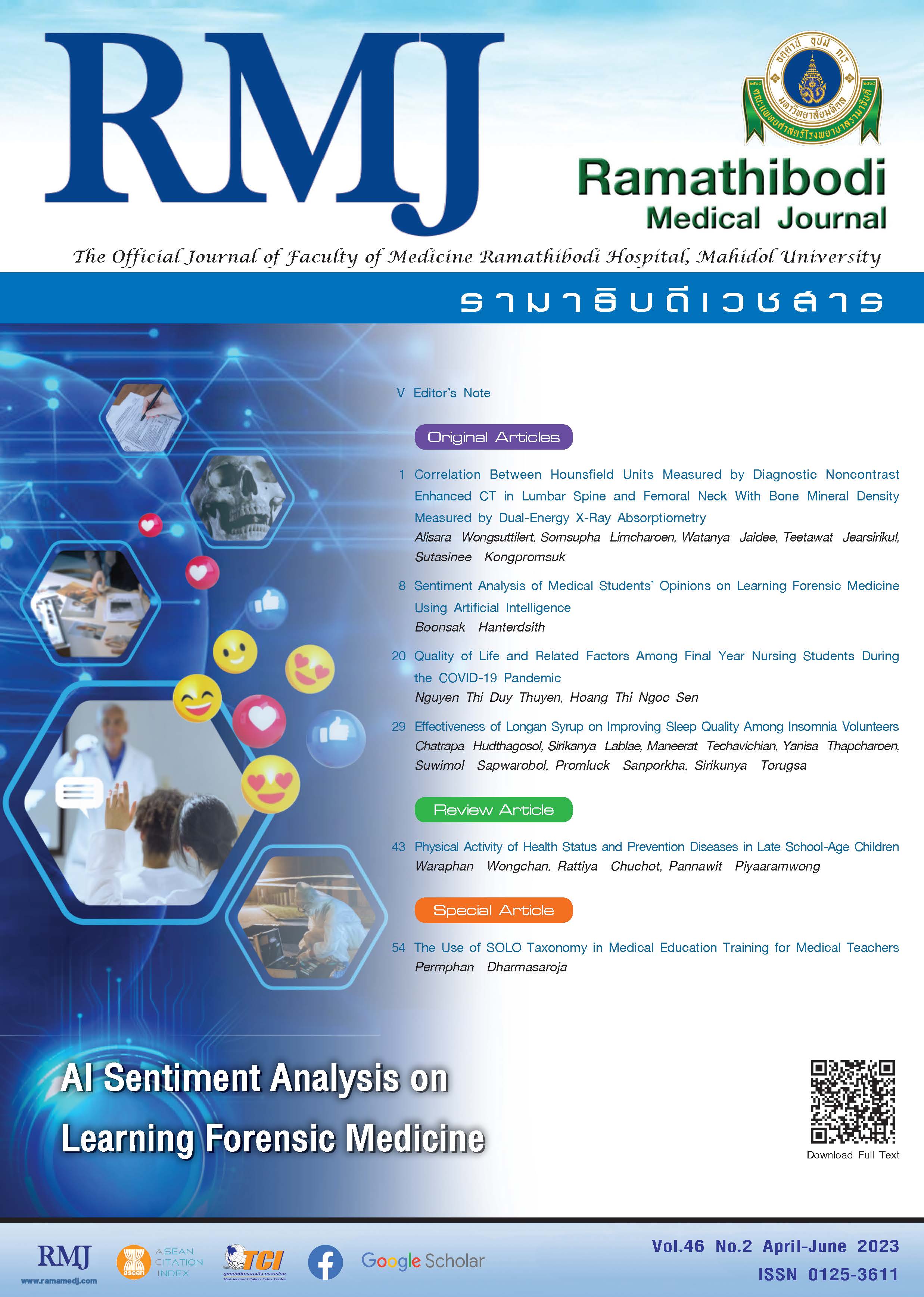Sentiment Analysis of Medical Students’ Opinions on Learning Forensic Medicine Using Artificial Intelligence
DOI:
https://doi.org/10.33165/rmj.2023.46.2.262473Keywords:
Sentiment analysis, Students’ feedback, Forensic medicine learning, Artificial intelligenceAbstract
Background: Students’ feedback is an important process of learning quality improvement. With the advancement of technology, artificial intelligence (AI) has been used to analyze text. AI system called S-Sense that can analyze Thai-language text for sentiment and purpose.
Objectives: To analyze the intention of text and its sentiment, and to evaluate the reliability of S-Sense.
Methods: The text feedback from 5-year medical students on their learning of forensic medicine via Google Forms during the years 2017 to 2022 was analyzed by S-Sense and 5-individual.
Results: Of 226 students, 69 students (31%) responded to the questionnaire with text feedback. Among them, 56.52% were categorized as “requests”, while 40.58% were categorized as “comments”. The agreement between S-Sense evaluations, both in terms of purpose and emotion (Cohen κ = 1), was complete. However, the agreement between S-Sense and individuals was moderate (Cohen κ = 0.57) for purpose and fair (Cohen κ = 0.34) for emotion.
Conclusions: S-Sense can efficiently and reliably analyze Thai-language feedback but cannot replace human evaluators.
References
Microsoft. Analyze text with the Language service. Accessed April 25, 2023. https://learn.microsoft.com/en-us/training/modules/analyze-text-with-text-analytics-service/
Okoye K, Arrona-Palacios A, Camacho-Zuñiga C, Achem JAG, Escamilla J, Hosseini S. Towards teaching analytics: a contextual model for analysis of students’ evaluation of teaching through text mining and machine learning classification. Educ Inf Technol (Dordr). 2022;27(3):3891-3933. doi:10.1007/s10639-021-10751-5
National Electronics and Computer Technology Center. Thai Artificial Intelligence Service Platform under the theme “Thai AI” to support users in Thailand. Accessed April 25, 2023. https://aiforthai.in.th/aiplatform/#/ssense
Kastrati Z, Dalipi F, Imran AS, Nuci KP, Wani MA. Sentiment analysis of students’ feedback with NLP and deep learning: a systematic mapping study. Appl. Sci. 2021;11(9):3986. doi:10.3390/app11093986
Shaik T, Tao X, Li Y, et al. A review of the trends and challenges in adopting natural language processing methods for education feedback analysis. IEEE Access. 2022;10:56720-56739. doi:10.1109/ACCESS.2022.3177752
Chandurkar T, Tijare DP. Sentiment analysis: a review and comparative analysis on colleges. Int J Sci Res Comput Sci Eng Inf Technol. 2021;7(2):526-531. doi:10.32628/cseit217266
Cohen J. A coefficient of agreement for nominal scales. Educ Psychol Meas. 1960;20(1):37-49. doi:10.1177/00131644600200010
Bhatt C, Namdeo V. A survey on sentiment analysis and its challenges using machine learning algorithms. Journal of Xidian University. 2020;14(8):1138-1145. doi:10.37896/jxu14.8/119
Sadriu S, Nuci KP, Imran AS, Uddin I, Sajjad M. An Automated Approach for Analysing Students Feedback Using Sentiment Analysis Techniques. In: Djeddi C, Siddiqi I, Jamil A, Ali Hameed A, Kucuk İ, eds. Pattern Recognition and Artificial Intelligence: Proceedings of 5th Mediterranean Conference, MedPRAI 2021; December 17-18, 2021; Istanbul, Turkey. Springer; 2022:228-239. doi:10.1007/978-3-031-04112-9_17
Saraswathi D, Jeno Sandana Brina Rouvier F, Venba B. Survey on sentiment analysis using machine learning algorithms. J Emerg Technol Innov Res. 2021;8(8):e348-e354. Accessed October 1, 2022. https://www.jetir.org/papers/JETIR2108528.pdf
Downloads
Published
How to Cite
Issue
Section
License
Copyright (c) 2023 Ramathibodi Medical Journal

This work is licensed under a Creative Commons Attribution-NonCommercial-NoDerivatives 4.0 International License.

















